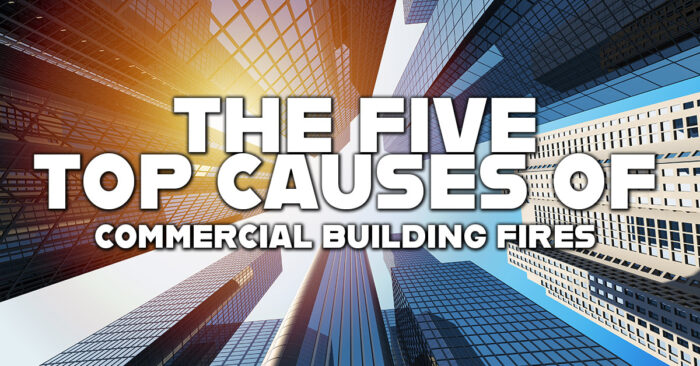Commercial Building Fires: The Five Top Causes

Commercial Building Fires: The Five Top Causes
Even in larger communities, commercial fires are almost certain to make headlines. While structures, alarms, safety equipment and response times are far superior to those of just decades ago, commercial fires are still costly. What are the likely causes of these fires in commercial structures like offices, stores, hotels, warehouses and manufacturing plants? Here are the top five.
- Arson
Intentional fires, or arson are the fifth leading cause of fires in the United States. Fires of a suspicious nature are not necessarily arson.
- Smoking
While tobacco use is down, smoking materials are still a major cause of commercial fires. Businesses should have proper containers in designated smoking areas for cigarettes to be properly extinguished.
- Electrical and Lighting
It is somewhat understandable that the amount of electrical wiring and lighting in a commercial building can make a structure susceptible to fires. Wiring and lighting fixtures should be updated in older buildings and wiring and circuit breakers need to be sufficient to meet today’s demands.
- Heating Equipment
Heating equipment in commercial buildings, like homes, is a major contributor to fires in the country. Older equipment and space heaters are problematic in commercial structures, especially in buildings that remain empty overnights and on weekends. Never use household extension cords with space heaters and make sure they are turned off when not in use.
- Cooking
At first, it may seem surprising that cooking would be the greatest cause of fires in commercial buildings, until you realize that at least some cooking is done in just about every commercial structure. Even small offices are likely to have a small kitchen or area where there is a microwave and coffee machine. When you add in the fact that restaurants, hotels, hospitals and other commercial buildings have a significant amount of cooking that takes place, the problem is easier to recognize.
Damage from fires is one of the calamities that are usually covered by even the most basic business insurance program. An exception to fire damage that would be covered would be that related to arson, where there is significant evidence the fire was intentionally started.
Your business and commercial structure faces multiple threats each day, with fires just being one of them. Are you properly covered? Contact one of our business insurance specialists and get your no cost, no obligation business insurance review and price quote. We are here to help protect your business.
Do you have questions about your insurance? Find an insurance agent near you with our Agent Finder
Search All Blogs
Search All Blogs
Read More Blogs
The Mystery of the Plastic Baby: A Guide to Mardi Gras and the King Cake
Why is there a baby in the cake? Discover the history and traditions of Mardi Gras 2026 and the delicious mystery of the King Cake.
Let the Good Times Roll—Safely: Mardi Gras Liability for Your Business
Hosting a Mardi Gras party this Tuesday? Make sure your business has the right event liability and liquor coverage before the beads start flying.
The Business “Prenup”: Why Business Partners Need Life Insurance in February
Love your business partner? Protect your company with a Life Insurance-funded Buy-Sell agreement to ensure the business survives the unexpected.
Heading South? Insuring Your Mid-Winter Break Road Trip in February
Driving to find some sun this week? Check your roadside assistance and rental car coverage before you leave the driveway.
Spring Dreams, Winter Schemes: Updating Your Insurance Before Your Spring Renovation
Planning a Spring kitchen remodel? Learn why you need to call your insurance agent before the contractors arrive to ensure your project is covered.
Shadow or Spring? The Quirky Science and Folklore of Groundhog Day 2026
Will he see his shadow? Dive into the history and humor of Groundhog Day 2026 and why we still trust a rodent with our weather forecasts.
Stocked for Love: Protecting High-Value Valentine’s Inventory with Business Insurance
Is your Valentine’s stock protected? Ensure your business insurance accounts for the massive inventory surge happening in early February.
New Life, New Responsibility: Why a February Arrival Means Updating Your Policy
Welcoming a new family member this February? It’s time to move life insurance to the top of your to-do list to ensure your child’s future is secure.
Delivering Love: The Insurance Risks of Valentine’s Week Gig Work
Delivering flowers or chocolates for extra cash this Valentine’s? Make sure your car is actually insured for delivery work before you hit the road.
Tax Prep & Protection: Ensuring Your Home Office is Fully Insured for 2026
Prepping your taxes? Don’t forget to check your home office insurance. Your standard policy might not cover your professional gear or liability.









